Ron Kovic’s Simple Talk in a Country Graveyard
Kovic’s latest book completes his Vietnam Trilogy, delving deep into his long and often agonizing journey home from war and eventual healing, forgiveness, and spiritual redemption.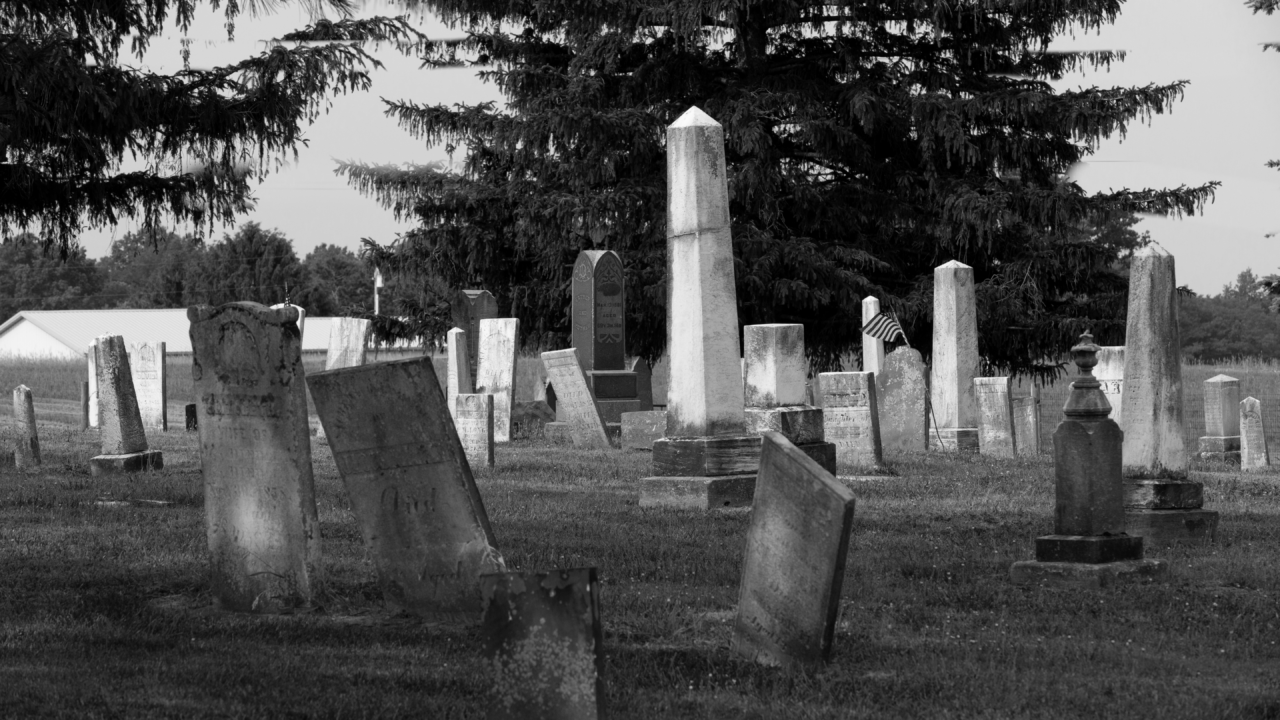 American graveyard. (Image: Adobe stock)
American graveyard. (Image: Adobe stock)
An excerpt from A Dangerous Country: An American Elegy, ©2024 Ron Kovic, used with permission of the author and Akashic Books.
It will be nothing more than a simple talk in a country graveyard, a moment of reckoning of sorts, shared between life and death. I want to tell you of that night, and of what happened in all those years you would have lived if I hadn’t killed you; a very private conversation on this dark and rainy afternoon, a quiet time together that no one else will share but you and me.
A great bird flutters over the graveyard, as black as pitch, as dark as night. It is raining and there is no wind, there is only this gravestone and memory of you, and I ask you to listen to me now, even in death. Please, I can’t wait any longer, the death tide has come; the time has come to speak. I can barely remember your face. I met with you for only a minute. It was in the battalion area just before we were about to leave on patrol. I can hardly remember what you said. You told me you had a wife. I think you said that. You were from Georgia—Dalton, Georgia. I asked how old you were. I don’t remember anything else. The darkness came and it was time to leave on patrol. You had a mustache with the ends curled up in wax. We did not talk after that. I would not hear your voice again until you were dying and choking in the ditch later that night.
Many times I imagine riding a motorcycle at high speed, aware that at any second I might be thrown off and killed, yet I keep pressing the throttle down harder and harder, challenging myself to go deeper into my trauma, knowing that if I am able to complete this book it might just free me from these terrible feelings of guilt and shame.
I had often thought of what it would be like to kill a man, how it would feel to pull the trigger and take a life out of this world, to blow away another human being, to blow away a gook. I’ll do it, I thought. If I have to, I’ll do it.
I can still remember the moment it happened. It was raining and we were walking on patrol just south of the battalion area. It was sometime around 2300 when we crossed onto the edge of the village. It was then that we saw them, fifteen or twenty Vietcong with rifles bunched up in a crowd.
Someone shouted, “There they are!”
I don’t know who started firing first. There were muzzle flashes in the night from where the enemy stood, and the crack of bullets over our heads. I told everyone to hold their ground. I shouted for them to stay and fight. I fired my rifle toward the flashes from the enemy’s guns and figures in the dark. I went down and fired from one knee. I was very frightened, but I tried to hold my ground. I took a deep breath, forcing myself to stand still and control the fear and panic that had just swept over me.
After the first cracking of the bullets and flashing of their guns, I was now slowly gaining control. My first reaction had been to retreat, but now I began urging the men forward, screaming as loud as I could through the roar of our weapons, all blasting into the night at once. My heart had begun racing through my chest the moment they started shooting at us. We were facing each other off in the dark, a dozen men on each side, rifles and bullets, fifty meters apart. We fired into the crowd of shadows that for a second held their ground too. We had stumbled into each other, the enemy and ourselves in the middle of that moonlit night.
But the men broke and they started running. I yelled for them to stop, but they ran in a panic. I kept firing from my hip, yet they were behind me now, and I raced back trying to catch up with them, still shouting for them to stop: “Keep fighting! Keep fighting, men!” But they kept running backward and soon my courage left me and I began to run with them, the fear now consuming me, back into a ditch in the sand along the beach that was filled with water up to our knees. We had made it, all of us, I thought. The water was cold and my heart was still pounding. Men were screaming and firing their rifles all around me, cursing and swearing; and then, for an instant, it was silent, only the sound of someone running, a figure in the distance, moving toward me in the moonlight.
I had a second to think. “Here they come!” yelled a voice from down in the ditch. “Here they come!” he shouted even louder now. I raise my rifle. He’s coming right toward me. He’s almost on top of me. I see his gun, a man in the dark coming right at me with a rifle. It was either him or me. I have a second to decide. I raise my rifle. I aim just above my sight. I fire three times. The rifle recoils against my shoulder again and again and again. The attacker falls almost on top of me. He does not move. Have I killed him?
“It’s Wilson!” someone shouts. “He’s hit!” That one split-second when I heard them call out your name, I felt a jolt, an incredible jolt through my body. It was unlike anything I had ever felt before in my life, followed by a sickening dread. I had just shot one of my own men. I felt weak, as if I was about to faint. I couldn’t breathe. Oh my God, oh my God! Do they know I did it? They must, they have to. I was the only one who’d been firing.
They drag your body back into the ditch. Everything is a blur of panic and fear. My God! I lie in the water of the ditch still holding the rifle I shot you with. I don’t want to look. I don’t want to run over and help. I just shot you, how can I look? They scream, they shout, working feverishly, trying to save you.
“He’s hit in the throat!”
As you die before me, it is a nightmare. I hear them screaming as they try to save you, but I feel nothing. Like some horrible dream that I am trapped in that I can’t get out of that is just beginning and will never end, never be over for me until I am dead.
“He’s still alive!” I hear someone shout.
I’ve wounded him, I think. I haven’t killed him. Better that he was dead! That way no one will know. He’ll want to kill me if he survives and finds out I shot him, his own squad leader.
“He’s got it in the throat! He’s bleeding bad.”
I try to block out their words.
“He’s still breathing!”
My heart sinks. Why would I ever want him to die? What was I thinking? “How’s he doing now?” I suddenly shout into the panic all around me, trying to act as if I’m still the sergeant, still in control, and take the blame away from me.
“He’s dying . . . I don’t think he’s going to make it!” a voice calls out.
Oh live, Wilson . . . please don’t die—live! I almost shout. Please, Wilson, live!
“He’s dead!”
It hit me like nothing I’d ever felt before, and like nothing I will ever feel again.
“He’s dead, Wilson is dead!”
You’re gone, dead. I’m in the water, in the ditch, holding the rifle that just killed you. I close my eyes. I don’t want to believe this is happening. I want to sink into the sand and die right with you. The panic and fear begin to surge inside me once again. I feel guilt, terror, shame, and anger, all these emotions at once sweeping over me. I look around—no one has accused me. No one has said I did it.
It is a moonlit night in October of 1967 in the DMZ and I have just made the biggest mistake of my life, and no one, not one of my men, has blamed me for your death. But I know soon they will accuse me if I don’t do something.
I feel alone and heavy in the ditch. There is silence, an eerie silence along the line of men, and they all seem to be staring at me. What should I do? Should I say I did it? But no one has accused me. Not one of my men has blamed me for your death. Do they know? Of course they do. They must. But why aren’t they saying anything? Why is there this silence?
I start giving orders, barking commands fiercely to hide my shame and guilty feelings and the awful fear and dread that go with them. What’s wrong with them? Don’t they know? Don’t they realize? Are they too afraid to say what happened? They know! They know! But why, why didn’t they say anything that night?
We head back to the battalion area in the amtrac, your lifeless body at my feet, my heart still pounding in my chest. I cannot look down at you. I cannot look. I return to my hooch with the others where I sit on my rack unable to sleep, tormented by guilt and shame.
Shaking with your death still on my hands, and the other men now asleep in their racks around me, I pick up my rifle, raising the barrel to my head. I press the barrel between my eyes and take off my boot, placing my toe on the trigger. Just one push of the trigger with my toe will be all it will take and I will be free from all of this, free from my murdering hands and this awful nightmare that threatens to overwhelm me. One pull of the trigger and I’m free, free from their accusing stares, their looks of disgust.
You fool! I thought to myself. How could you have done something so stupid? What about your training? Didn’t you learn anything in Marine Corps boot camp? What are you going to tell his parents? What are you going to tell his wife? Oh God . . . Oh Jesus . . .
I sat there in my hooch, the rain still pouring down, the night so dark and low, the coldest moment of my life; everything wrecked, all in a shambles, every dream, every thought and hope, everything learned, every happy moment suddenly crushed in an instant, one night, one mistake, one moment in hell frozen forever; nothing to hold on to. I sat in my hooch that night shivering from your murder, the barrel of my M14 pressed up against my forehead, my toe on the trigger, the other men sleeping in their racks all around me.
As the rain continued to pour onto the corrugated roof of our hooch that night, I struggled to write a letter to your wife.
Dear Mrs. Wilson,
I was the sergeant in charge of your husband’s patrol on the night of October 15, 1967. After a firefight with the enemy, he fought bravely, giving us cover as we moved into another position . . .
I tried to explain what happened, why her husband was dead. In the first letter I told your wife everything that happened that night, how we went on patrol and got hit, how we all ran to the ditch, and how you stayed behind fighting the VC. “He was a hero protecting his fellow marines as we moved to another position.” I did not tell her that we panicked. I did not say we retreated. Then I lied. I told her you were hit on your way back to our position, shot by the enemy. I told her I was putting you in for a Bronze Star. But I could not finish the letter and I tore it up.
I then began to write a second letter. In this one I decided to tell your wife the truth:
I don’t know how to tell you this, Mrs. Wilson, but I was the one who killed your husband. I ask you to please forgive me for the awful mistake I have made and what must be the terrible anguish you and your family are feeling at this moment. I am sorry. I am so sorry and I am putting your husband in for a Bronze Star medal.
I started to cry as I wrote that second letter, as I had been unable to cry when I wrote the first.
I just want to tell you I’m sorry, Mrs. Wilson, for what I’ve done, and I hope you and your family will forgive me. I am so ashamed and I pray and ask God for help and forgiveness.
I finished the letter feeling exhausted and relieved that I had done it. I would send it to her. It is what God would want me to do. I couldn’t lie to her. I couldn’t keep what happened out there from her. I’ll send it, I said to myself, folding it up. I’ll send it and be done with all this pain and agony.
But I couldn’t send it! I couldn’t tell her what had happened. It would be so easy to tell her that you’d been killed by the VC. It was so far away, Georgia, over ten thousand miles. What did they know about Vietnam? What did they know about patrols and firefights? What difference did it make what I told her? Why should I make her feel any worse? You were dead already, weren’t you? Why make it any more tragic than it already was?
I was tormented. I had to make a decision.
Then I decided: I sent nothing.
I tore up both of the letters, making certain they were shredded into little bits, not wanting any evidence of what I had done, afraid someone might find my confession and accuse me, knowing for sure that I had killed you.
On only a few rare occasions did I ever come close to revealing to others what happened that night. I did share with my mother the story of how I was wounded, but never did I tell her of the night I shot and killed you. I did all I could to avoid that. The nightmares had already begun, the anxiety attacks, insomnia, and difficulty closing my eyes before I went to sleep at night for fear that I might never wake up.
At the debriefing, I told the major that I had been the one who killed you. I made a full confession, but he would not believe me—though I’m certain he knew—just like the night a few weeks later when we mistakenly shot and wounded the children and killed the old man; and we picked up the pieces of their bodies and put them on the choppers.
A few days later I met a Vietnamese boy named America while on patrol not far from where we killed the old man and wounded the children that night. I wonder what became of that boy. I told him we came to save his country from Communism and that I was sorry for the mistake we had made. We did not know that those we had been sent to protect and save would be the ones we would kill and maim. I spent the entire day with him. He liked me and I wonder if he ever thinks of me after all these years. And the boy whose foot we shot off by mistake? I wonder where he is tonight; I wonder how his mother is.
When the major told me the following morning that the people we had killed and wounded the night before were VC, I did not believe him. They were innocent civilians, I told him, women and children and an old man we thought were the enemy. I told him I was sick of going out on patrol and that it was hard to tell who the enemy was anymore. Like I said, body count was all that mattered.
The Tent of the Dead
This is the tent of the dead. There is a sign that says, Keep out. Dead American boys are inside. If you look closely, you will see war in its most awful consequence. It is where you were sent after the night I killed you, where you and the others were prepared for your return home. Please, do not go in that tent because you will see the warriors, and you will not like what you see. For you will see them before they have been readied to look good and smell clean, before their bullet and shrapnel holes are patched up and their bloody garments replaced, before their angry stares have been removed, their eyelids pressed down to hide their last scream for life, to cover up their rage at having to leave this world so soon. This is the tent of the dead, where the blood is mopped up and the intestines are put back into place for the long journey home. This is where you were sent, where your body was fixed up and prepared, you, who I killed in that instant of indecision, in that moment of panic and doubt. I pulled the trigger and took a life from this world, so sure you were the enemy. Now you lie in that tent.
Your support matters…Independent journalism is under threat and overshadowed by heavily funded mainstream media.
You can help level the playing field. Become a member.
Your tax-deductible contribution keeps us digging beneath the headlines to give you thought-provoking, investigative reporting and analysis that unearths what's really happening- without compromise.
Give today to support our courageous, independent journalists.
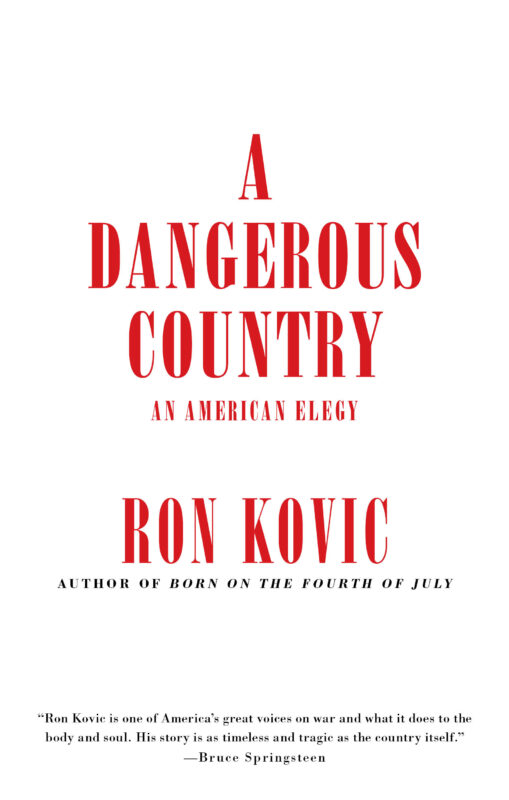

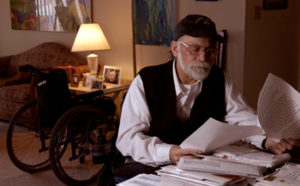
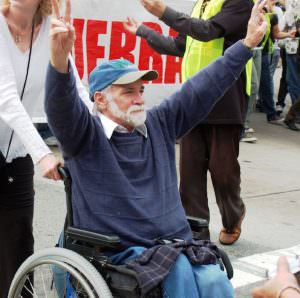
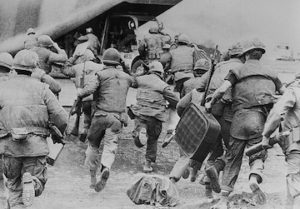

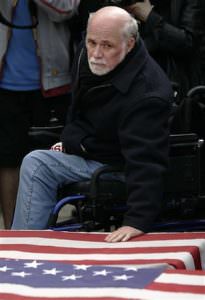
You need to be a supporter to comment.
There are currently no responses to this article.
Be the first to respond.